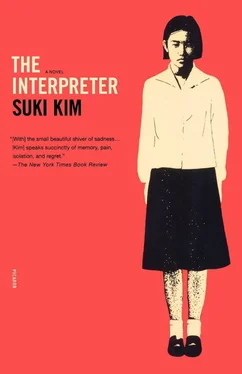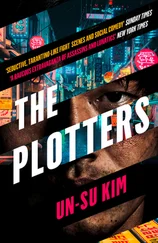“No, I can’t help you. I remember nothing.” Suzy is tempted just to get up and walk out, but she continues, “What I’m curious about is why you didn’t see any of this five years ago. If the shooting method seems so familiar, why didn’t you suspect them then? Why did you call it a random shooting and ignore it for five years?”
Turning his back on her, Detective Lester faces the window, a tiny slit between the metal filing shelves which Suzy has not even noticed until now. He stays silent for a while with his arms folded across his chest, and then, without turning around, he says, “I’m not surprised that you’re upset. But we’re not God here in the Police Department. We’re not Sherlock Holmes. We might not always get to do the right thing. Several hundred murders in the borough every year, it’s hard to go after each one.”
The last bit gets to her. Hard to go after each one . So they haven’t even tried. It’s taken five years to look for a motive. This incompetent detective. This idiot of a man who called the execution random. And the murderer still somewhere loose, still so far from their grip. But nothing is fair. Nothing has been fair for so long. Five years. Why?
“I just don’t understand why you’re suddenly so interested in finding my parents’ murderer. The Asian Organized Crime Task Force. The Narcotics Squad. All of that means nothing to me. Are the stakes bigger now? Now that gangs and drugs spice up what happened five years ago; now that all the higher branches of your police force are having a field day with whoever might’ve murdered my parents; now that my parents might be more than just a middle-aged Asian couple shot dead in their store? Tell me, Detective, do you get a medal if you score this one? A promotion?”
He must be used to such outbursts. He may even expect them. When he finally turns around and faces her, the furrows between his eyebrows look deeper. He does not like doing this either, she can tell. It is a hard job, to pick up after the most hideous of all crimes. “We didn’t ditch them cold, Suzy.”
A sudden fatigue washes over her. Nothing more will come out of her. Everything seems to be crashing down at once. Damian, she misses him infinitely. Damian, what happened to Damian? Wasn’t he supposed to take her away from all of this? Wasn’t that why she lay in his matrimonial bed at twenty, letting the blood trickle down her legs? Wasn’t that why she went with him despite everything, despite her youth, despite her then-living parents, despite her Ivy League college, despite all good common sense that had told her to stay still, stay where she was, stay in her rightful spot as the good Korean daughter? Wasn’t that what she had wanted after all? To run away from all of this?
“Listen, Suzy, we’ve gotta work together on this one. Your father, whether you wanna face it or not, must’ve had some gang connection. It might not even have been a bad one. Many immigrant store-owners pay dues, for protection or whatever. Your father might’ve just been one of many victims. He might’ve owed them some money. Maybe business was slow, and he took a loan and couldn’t pay. Something as little as that. But we need evidence. We need some concrete motive. You’ve gotta think, and think hard. You’ve gotta try to remember everyone your parents knew or had dealings with. Someone somewhere must know something. I’ve already sent some men over to the Hunts Point Market and the Korean Grocers Association. Something’s gotta give. It’ll just be faster if you can recall some names, so we can finally resolve your parents’ deaths.”
He is making sense, of course. He is even convincing. But Suzy is not sure. She still cannot buy into such sudden enthusiasm. Five years is a long time to do nothing. Any evidence must have long been erased.
“I thought you said that Korean Killers disbanded in the early nineties. My parents were shot in 1995. What dues would they have owed? To Triad? I thought they were Chinese. Do they collect dues from Korean stores too?”
He is glad that Suzy seems to be coming around. The shadow of guilt that had clouded his face is gone. He looks almost grateful when he tells her, “No. New York Triad mostly operates within Chinatown. But these ex-KK guys seem to have been sort of working under them for years, at the bottom of the rung since the breakup of their own group. Who knows, there might’ve been old debts, old scores to settle.”
“What about their claim that it was a setup? Isn’t it odd that they would bring it up only to deny it? I mean, if they’re guilty, why mention it at all, when they weren’t even being accused?”
“That’s why it was a slip. One of them thought that we’d already linked them to the murder, when in fact we had not a clue. He thought that was why he was taken in for questioning.”
“So you’re convinced that it was them?”
“I didn’t say that. But I’ll tell you this, I certainly wouldn’t give much weight to their denial.”
“And you’ve known nothing at all about these three guys until now, until they got raided in the pool hall with enough drugs to spread alarm through the entire New York Narcotics Squad?”
“It’s like this.” He begins pacing around the desk, as if shuffling the bits of information in his head. “KK disbanded nearly a decade ago. We know much more about the other groups, like Korean Power and Green Dragons, who’re both still active in the Flushing area. Korean gangs operate differently from either Chinese or Japanese gangs. They tend to keep a lower profile. They often have links to the bigger international groups, like Triad or Yakuza. They might occasionally do some dirty work for the big guys, but mostly they keep to their own. They raid their own Korean communities, who are infamous for never using banks, just hoarding cash in their homes. Easier for them, since Koreans rarely report gang crimes. The AOCTF calls it a ‘collective shame.’ A sort of responsibility, immigrant guilt for not having properly reared their second generation. You might understand that one better than I can. So, according to the AOCTF, it’s always harder to keep track of the Korean gang movements. They don’t know much about these ex-KK ones except that all three have done time for fraud, extortion, money laundering, the usual stuff. No murder, though; they’ve never been charged with murder. One interesting thing is that they used to call themselves the Fearsome Four. They obviously fancied themselves as a bit of legend in their own little-league way. They once each cut off their little fingers to honor their brotherhood, copying that crazy Yakuza ritual. But it seems that’s as far as their legend ever got. Other than doing a little time here and there, we’ve heard nothing about them until two weeks ago.”
“What happened to the fourth one?”
“Which fourth?”
“The Fearsome Four. If only three have been arrested, what happened to the fourth one?”
“Oh, he faded out of the picture long ago.”
“How?”
“Deported. Gone without a trace. He seemed to have split from his brothers soon after the KK breakup; anyway, it’s all hazy, who knows, maybe it was Maddog or one of his many ‘brothers’ who dropped a dime on him. But somebody reported him, and the INS tracked him down at a motel on Junction Boulevard and packed him home. Turns out the guy never even had a green card. One of those orphans who’d been shipped into the country, probably through the KK’s adoption fraud of the early seventies.”
“Which was?”
“The typical trick. They’d charge between ten and twenty grand for each Korean orphan adopted by an American couple, and then, once the deal goes through, pocket the money and sneak the kid away.”
“Why the kid too?”
Читать дальше












